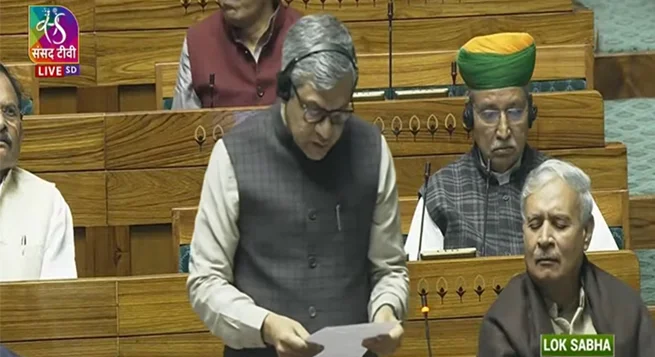Even as a large section of the industry went rah-rah over the Telecoms Bill 2023, introduced in parliament yesterday, terming it progressive, some concerns remained.
The big question is: can the Bill be passed by the government in the remaining period of the present session or will it do so during the short session when the interim Budget would be okayed sometime in February, considering the general elections would have to be held in the first half of 2024?
As the Telecoms Bill was introduced in Lok Sabha as a Money Bill, it does not need to go to the Rajya Sabha (Upper House) and the government, having a majority in the lower house, can easily see the safe passage of the Bill into a formal legislation, industry experts opined.
According to a PTI report, when Communications Minister Ashwini Vaishnaw initiated the process of introducing the Bill, BSP member Ritesh Pandey opposed its introduction as it was being brought in as a Money Bill and would not require approval of the Rajya Sabha. Pandey also sought that the Bill be sent to a parliamentary committee since there are concerns relating to privacy.
Industry Reactions: The government’s proposal in the Telecommunications Bill 2023 to allocate spectrum to satellite companies without auction, keep internet-based calling and messaging apps out of telecom rules, and measures to protect infrastructure is progressive and will boost digital connectivity, industry bodies said on Monday, according to a PTI report.
The Bill proposes allocation of spectrum to satellite communications companies through an administrative method without the need for bidding in auction. The issue of allocation methodology had divided the industry into those preferring auctioning of spectrums and those for administrative allocation.
Indian Space Association Director General AK Bhatt said satellite-based communication networks have a huge potential that can transform India into a truly digital and developed economy.
”By allocating the spectrum by administrative method for satcom, India could align itself with international standards, promote global cooperation and also help drive innovation, create opportunities for startups, and strengthen the country’s position in the global satellite market,” Bhatt said.
This would also spur growth in all downstream sectors of space providing impetus to the space economy in India, he said.
SIA-India, whose members include companies such as Viasat, Inmarsat, SES, Hughes Communications, etc, said the Bill aligns with international best practices for satellite spectrum assignments, placing a strong emphasis on fair and transparent administrative processes that conform to global standards.
”SIA-India, in its submission, emphasised on the importance of adopting methodologies that ensure maximum usability, and adhere to established international norms. The association extends its appreciation to the Indian government for its progressive stance on spectrum management in the satellite communication sector,” SIA-India Director General Anil Prakash said.
While the Bill defines transmission of messages through wire or wireless technologies as telecommunication, official sources said the definition is as per the old Act.
The internet-based messaging and calling apps like WhatsApp, Telegram, Google Meet will be covered under IT Rules and not under telecom laws as per government rules of business allocation.
Internet-based companies’ representative body Internet and Mobile Association of India (IAMAI), whose members include Google, WhatsApp, etc, hailed the Bill as email, internet-based communication services, broadcasting services, machine-to-machine communication services and over-the-top (OTT) communication services have been excluded from it.
”The time-tested distinction between telecom spectrum controlling entities (which are regulated) and spectrum-using companies should be maintained as it has been the basis that has allowed innovation and deeper penetration of internet in India,” IAMAI said.
The definition of messages as included under telecom rules has been interpreted differently by experts and the US-based industry body ITI, which represents global technology majors.
Telecom specialist and independent consultant Parag Kar said the Bill is historic as it decisively clarifies longstanding ambiguities surrounding the allocation of spectrum for crucial services such as satellite and backhaul.
He, however, said in the revised version of the Telecom Bill, there is a noticeable shift in the approach to licensing OTT services compared to the earlier 2022 draft.
Previously, OTT was explicitly categorised under ”telecommunication services” and the revised Bill in contrast opts for a more inclusive approach, encapsulating OTT within a broader definition of telecommunication.
”In essence, the proposed draft of the Telecom Bill grants the Government of India (GOI) discretionary power to classify OTT services as ‘telecommunication services’ if it chooses to do so. This is because, by their inherent nature, OTT services align with the broad scope of the term ‘telecommunication’ as defined in the bill,” Kar said.
ITI Country Director for India Kumar Deep said the industry body welcomes the revised version of the 2023 Telecommunications Bill as it refines the scope of the 2022 draft.
”While we are still reviewing the full text, the current definition of telecommunication services appears to be quite broad. We expect the government to conduct a consultation on the current version of the bill and welcome the opportunity to provide additional feedback,” he said.
The Bill proposes protective measures for telecom infrastructure and reinforces provision for a smooth rollout of networks, especially optical fibre cables.
The Centre has proposed exemption of telecom networks installed on any property from any claims, encumbrances, liquidation or the like, relating to such property, the PTI report said.
”The Telecom Bill 2023, tabled in Parliament today paves the way for robust telecom networks through a well-defined Right of Way (RoW) framework,” telecom industry body COAI said.
The Bill has proposed measures that will protect abrupt removal or any changes in the mobile tower or network elements from a property Digital Infrastructure Providers Association (DIPA) Director General T R Dua said the provisions in the Bill will bring uniformity across states in terms of Right of Way (RoW) rules and regulations, along with rates.
He said the bill aims to ensure the continuity of authorisation and provides for the continuation of rules, guidelines, and administrative orders issued under the existing regime.
”Additionally, the Bill safeguards digital infrastructure, stating that no public entity can take coercive actions against the telecommunication network without permission from a central government-authorised officer, except in cases of natural disasters or public emergencies.
”In conclusion, it will certainly ease the process of doing business and reduce compliance burdens, aiming to create a conducive business environment,” Dua said.
The Bill proposes to stop transmission and intercept messages in case of public emergency, in the interest of the public, to prevent incitement for committing offence etc.
”On the occurrence of any public emergency, including disaster management, or in the interest of public safety, the central government or a state government or any officer specially authorised in this behalf by the central government or a state government, if satisfied that it is necessary or expedient so to do, by notification—take temporary possession of any telecommunication service or telecommunication network from an authorised entity,” the Bill said, the PTI report stated quoting from the Bill.
According to the Bill, the press messages meant for publication in India of correspondents accredited to the Centre or state governments shall not be intercepted or detained unless their transmission has been prohibited under rules applicable for public emergency, public order etc.
Spectrum Allocation: ”The central government shall assign spectrum for telecommunication through auction except for entries listed in the First Schedule for which assignment shall be done by administrative process,” the Bill said.
The first schedule has 19 cases for which spectrum will be assigned through administrative process including global mobile personal communication by satellites, national long distance and international long distance services, mobile satellite services, VSAT, In-Flight and maritime connectivity, BSNL and MTNL.
The Bill defines cases when spectrum will be assigned through an administrative method.
”Auction will be the preferred mode of spectrum allocation. However, in cases where auction of spectrum is not the preferred mode of assignment due to technical or economic reasons or to serve public interest or to perform government function, the spectrum will be assigned administratively,” an official citing the Bill said, the PTI report further added.
According to sources, the price for administrative allocation of spectrum for satellite service will be decided based on reference sought from Trai while BSNL and MTNL will need to match the auction determined price.
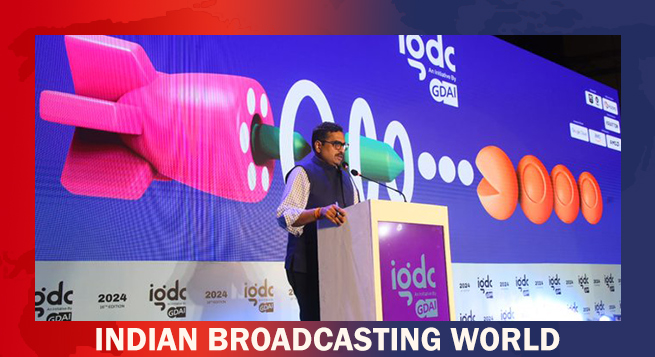 Govt & industry to prime gaming space for global dominance: MIB Secy Jaju
Govt & industry to prime gaming space for global dominance: MIB Secy Jaju 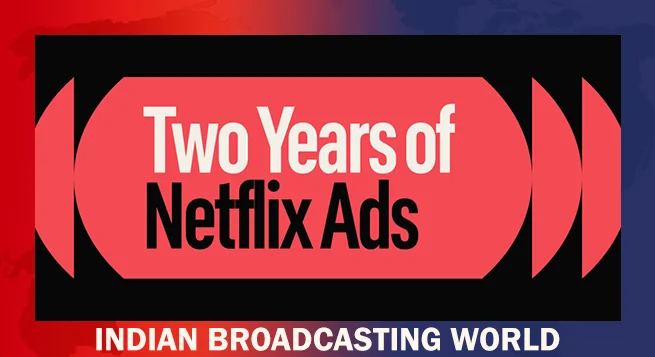 Netflix ad-supported tier touches 70mn MAUs globally
Netflix ad-supported tier touches 70mn MAUs globally 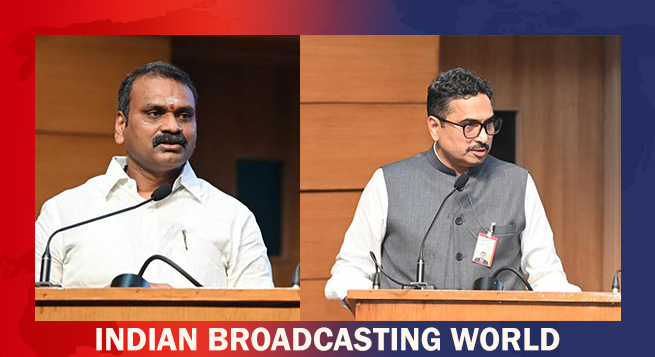 Minister Murugan likens IFFI to Cannes fest; ‘Better Man’ opening film
Minister Murugan likens IFFI to Cannes fest; ‘Better Man’ opening film 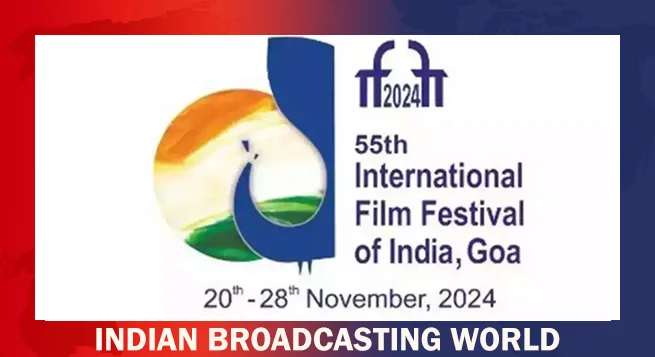 55th IFFI to introduce entertainment extravaganza IFFIESTA
55th IFFI to introduce entertainment extravaganza IFFIESTA  ‘Citadel:Honey Bunny’ rocks globally in launch weekend: Prime Video
‘Citadel:Honey Bunny’ rocks globally in launch weekend: Prime Video  Satish Kaushik’s last film ‘Mirg’ streaming on JioCinema
Satish Kaushik’s last film ‘Mirg’ streaming on JioCinema  Samsung TV Plus adds 4 Viacom18 FAST channels
Samsung TV Plus adds 4 Viacom18 FAST channels  The Advertising Club to hold D:CODE on Nov 28
The Advertising Club to hold D:CODE on Nov 28  Suhana Khan is brand ambassador for Vivo Y-series phones
Suhana Khan is brand ambassador for Vivo Y-series phones 


